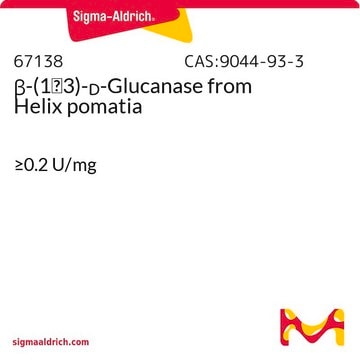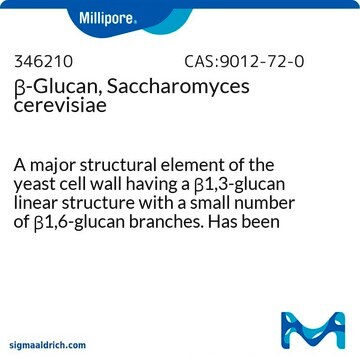49101
β-Glucanase from Aspergillus niger
powder, dark brown, ~1 U/mg
Sign Into View Organizational & Contract Pricing
All Photos(2)
About This Item
Recommended Products
form
powder
specific activity
~1 U/mg
greener alternative product characteristics
Waste Prevention
Design for Energy Efficiency
Learn more about the Principles of Green Chemistry.
sustainability
Greener Alternative Product
color
dark brown
greener alternative category
storage temp.
2-8°C
Related Categories
General description
We are committed to bringing you Greener Alternative Products, which adhere to one or more of The 12 Principles of Greener Chemistry. This product has been enhanced for energy eficiency and waste prevention when used in cellulosic ethanol research. For more information see the article in biofiles.
Biochem/physiol Actions
β-glucanases degrade β-1,4-glucans of cellulose, xyloglucan and β-1,4-xylan.
Unit Definition
One unit corresponds to the amount of enzyme which will release 1 μmole of reducing sugar equivalents (expressed as glucose) per minute at pH 5.0 and 55 °C, using β-D-glucan (Cat. No. 49102) as substrate
Signal Word
Danger
Hazard Statements
Precautionary Statements
Hazard Classifications
Resp. Sens. 1
Storage Class Code
11 - Combustible Solids
WGK
WGK 1
Flash Point(F)
Not applicable
Flash Point(C)
Not applicable
Personal Protective Equipment
dust mask type N95 (US), Eyeshields, Gloves
Certificates of Analysis (COA)
Search for Certificates of Analysis (COA) by entering the products Lot/Batch Number. Lot and Batch Numbers can be found on a product’s label following the words ‘Lot’ or ‘Batch’.
Already Own This Product?
Find documentation for the products that you have recently purchased in the Document Library.
Customers Also Viewed
Jiufu Qin et al.
Sheng wu gong cheng xue bao = Chinese journal of biotechnology, 26(9), 1293-1301 (2010-12-15)
In vitro evolution methods are often used to modify protein with improved characteristics. We developed a directed evolution protocol to enhance the thermostability of the beta-1,3-1,4-glucanase. The thermostability of the enzyme was significantly improved after two rounds of directed evolution.
T Kanda et al.
Journal of biochemistry, 79(5), 989-995 (1976-05-01)
An endo-cellulase [EC 3.2.1.4.] of carboxymethyl-cellulase type (F-1) which was fractionated from culture filtrate of Irpex lacetus and purified to electrophoretic and ultracentrifugal homogeneity, was found to show xylanase [EC 3.2.1.8.] activity. The activity was not removed from any of
W D Bauer et al.
Plant physiology, 51(1), 174-187 (1973-01-01)
The molecular structure, chemical properties, and biological function of the xyloglucan polysaccharide isolated from cell walls of suspension-cultured sycamore (Acer pseudoplatanus) cells are described. The sycamore wall xyloglucan is compared to the extracellular xyloglucan secreted by suspension-cultured sycamore cells into
C J O'Shea et al.
Journal of animal science, 88(4), 1411-1420 (2009-12-22)
The objective of the current experiment was to evaluate the influence of dietary cereal sources of beta(1,3)(1,4)-d-glucan (beta-glucan) and enzyme supplementation on indices of environmental pollution from finisher pigs. An experiment with a 2 x 2 factorial arrangement of treatments
Xiaohu Shao et al.
New biotechnology, 29(3), 302-310 (2011-10-05)
An improved surface-immobilisation system was engineered to target heterologous proteins onto vegetative cells and spores of Bacillus thuringiensis plasmid-free recipient strain BMB171. The sporulation-dependent spore cortex-lytic enzyme from B. thuringiensis YBT-1520, SceA, was expressed in vegetative cells and used as
Our team of scientists has experience in all areas of research including Life Science, Material Science, Chemical Synthesis, Chromatography, Analytical and many others.
Contact Technical Service







